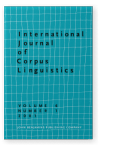Vol. 6:1 (2001) ► pp.134–150
The Grammar and Use of Korean Reflexives
This paper discusses the relationship between grammar as linguistic knowledge, as envisaged in Generative Grammar, and usage, the result of performance. In concrete, I analyze the use of Korean reflexives ‘caki’, ‘casin’, and ‘cakicasin’ by examining the occurrences of these reflexives in a 5-million-word Korean corpus, taken from a 10-million-word Korean corpus which is called “KOREA-1 Corpus”, compiled at Korea University (H. Kim and B. Kang 1996). This corpus is composed of various genres of Korean texts including 10% of spoken material. From the KWIC concordances of accusative forms of these reflexives, ‘cakilul, casin-ul, cakicasin-ul’, I examined whether a reflexive has a local antecedent or a long-distance antecedent. The result is that ‘caki’ is almost even in having local and long-distance antecedents, but ‘casin’ has more and ‘cakicasin’ has much more local antecedents. I also examined the thematic roles of the local antecedents of reflexives, which shows that ‘casin’ has relatively more Experiencer antecedents than ‘caki’ has, although in both cases Agent antecedents dominate. The outcome of this frequency analysis suggests that a tendency (probably not yet grammaticalized), or degree of “naturalness” is real and can be captured in the usage data provided that we have a sizable amount of material which can be handled in an efficient way as provided by the corpus linguistic method of the present day. At the least, the result of such an investigation can provide a solid base from which further theorizing may proceed.
Cited by (9)
Cited by 9 other publications
This list is based on CrossRef data as of 4 july 2024. Please note that it may not be complete. Sources presented here have been supplied by the respective publishers. Any errors therein should be reported to them.
